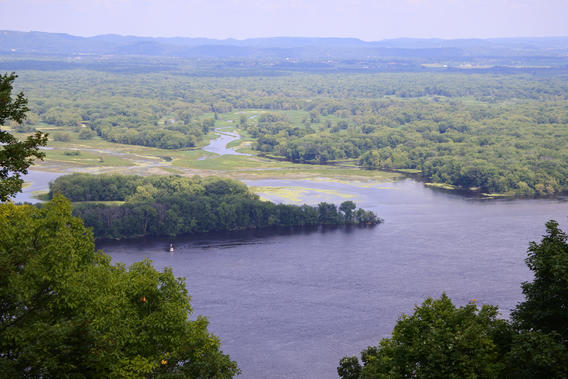
The Midwest Climate Change Vulnerability Assessment tool integrates climate and hydrological data to classify the capacity of watersheds in the region to adapt to climate change.
Challenge: Engage users to inform enhancements and opportunities to improve usability and communication of uncertainty.
Principal Investigator(s):
- John Delaney (Upper Midwest Environmental Sciences Center)
Co-Investigator(s):
- Kristen L Bouska (Upper Midwest Environmental Sciences Center)
Partners:
- Upper Mississippi River Basin Association
- Minnesota Department of Natural Resources
- Wisconsin Department of Natural Resources
- Iowa Department of Natural Resources
- Illinois Department of Natural Resources
- Missouri Department of Natural Resources
- Indiana Department of Natural Resources
- Michigan Department of Natural Resources
- Ohio Department of Natural Resources
- U.S. Forest Service
- U.S. Fish and Wildlife Service
- National Park Service
Climate vulnerability assessments are tools that aid in understanding why specific resources are vulnerable to projected changes in climate. A recently developed online climate vulnerability assessment dashboard helps understand where vulnerability is projected to be greatest across watersheds in the Midwest United States (Illinois, Indiana, Iowa, Michigan, Minnesota, Missouri, Ohio, and Wisconsin). This Northeast CASC-funded dashboard was created for, and in cooperation with, the U.S. Fish and Wildlife Service (FWS) to be useful to various FWS programs in the Midwest. With its broad applicability in mind, the dashboard has high potential to support other groups struggling to conceptualize and plan for the impacts of climate change in the Midwest.
The dashboard combines 15 climate change impact metrics (five each from three categories: hydrology, precipitation, and temperature), along with five metrics representing each watershed's ability to adapt to changing conditions, into a vulnerability score. Users weight the different metrics for their target of interest to generate custom vulnerability assessments. The results are maps that illustrate each watershed’s vulnerability to the impacts of climate change that can aid in setting management priorities and developing adaptation strategies.
The proposed project will update the functionality of the dashboard to better integrate and communicate the variability in climate change projections to users. This project will present the updated dashboard to resource managers working within the region and identify 1-2 partners to assist in the development of custom analyses and support for important resources.
Read more from the CASC Project Explorer.
